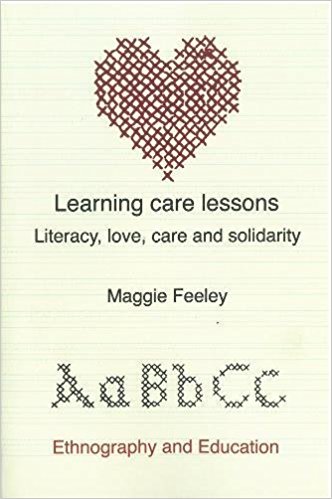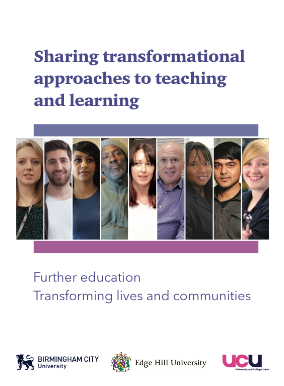 rThere is a fabulous UCU/Edge Hill University/Birmingham City University project, ‘Transforming lives and communities’ which you can read about here….(http://transforminglives.web.ucu.org.uk/about-this-project/). One of the main authors, Dr.Vicky Duckworth, who is a good friend of mine, has been involved in FE for many years. I admire Vicky massively, because as well as being a superb academic, teacher and researcher, she has always kept her feet on the ground – she really understands learners’ needs and goals, and their communities and families. This project, which Vicky has been involved in with Dr. Rob Smith from BCU, aims to understand and provide evidence of how the further education sector is vital in transforming lives and communities in 21st century Britain. The study provided students, teachers, parents and employers with the opportunity to tell their stories, linking the distinctness of FE to the impact it has on individuals, society and the economy. The study also emphasises the role of the teacher in making a difference to transformational teaching and learning. There has been a great UCU booklet on the project, which includes inspiring stories of transformation in learners’ lives, and of teachers caring, supporting learning and facilitating the transformation. I am really pleased to have been able to contribute to this booklet, and I’ve learned a lot through reading it, too. The booklet is here; it’s worth spending a bit of time looking at: http://transforminglives.web.ucu.org.uk/2017/06/05/sharing-transformational-approaches-to-teaching-and-learning/ Born out of this project was a conference and I was lucky enough to be invited to attend it. So yesterday I was at the ‘Reimagining FE’ conference, which was organised into group conversations in six thematic strands. There were also some fabulous keynotes (from Drs. Rob Smith and Vicky Duckworth; from Prof Lyn Tett and from Prof Maggie Feeley), and the whole day had an upbeat and buzzing atmosphere. On the way home on the train, with sore feet but nibbling at my treat of M&S macaroons, I was wondering about a number of things:
The reasons that the conference was invigorating was that it had the atmosphere of collegiality that is so often found in FE. People share their ideas and time generously and willingly. There is an atmosphere of respect and caring. And as well, there is a shared understanding of the constraints at local, national and international levels that impact on transformational education, and a shared vision of wanting to facilitate transformational education for the benefit of our students. Transformation was a great word to use – so many of the stories which we heard and shared were stories of ‘quiet caring’ making a difference, of learners seeing the possibilities of new identities and agency that transformative education offered them, their families and communities. So many of us are working with students to try and make things possible that the students might have imagined to be impossible; we all had that shared aim. It might not be the qualification per se that is key – instead, we talked about how the qualification might give students ‘permission’ to knock at certain doors or to dare to think about certain jobs or careers. We talked about how the processes of education and of the concomitant identity change in our students were what we really valued as teachers. It was also great to hear Maggie Feeley from the University of Dublin speak. I didn’t know Maggie’s’ work, but ever since I was first introduced to the work of Nel Noddings I have focussed on the importance of caring in education, so I was fascinated to hear Maggie’s keynote. She suggested that it was ‘obvious’ that we had to care – or should be obvious. She said ‘being cared for in a general way helps us to learn’. As human beings, we know that that is true; we certainly see it in our everyday experiences as educators. Maggie also put forward a conceptual model of learning care, which included care relations at a number of levels and which she explains in her book, ‘Learning Care Lessons’. The book details her ethnographic exploration of learning care carried out with adult survivors of institutional abuses in the Irish industrial schools. Caring for each other as workers in education was a development of the theme which we were careful not to ignore. All too often there is no-one to care for the carers, and for those of us who have worked in different sectors, there is a sense in which this vacuum feels a lot more empty in FE than in other sectors. Yesterday’s conference was a good example of how good FE teachers are at caring. Sometimes it’s done noisily, when we need to make a point, perhaps about the ways in which education or Further Education and Training in particular is often ignored; but so much of our caring for students and others is through ‘underground’ or ‘corridor’ working. It’s the coffee bought for a colleague who has been working hard with a distressed student; cakes baked for the whole department after the assessments have all been marked; figs and water being offered to those students who are breaking their fast in our evening classes. Or perhaps just a quiet smile, or an email saying ‘thanks’. Teachers are good at all those things, and FE teachers especially so, in my experience. So I wanted to stay at the conference, because of caring, because of transformation, because of participation and respect. So my second question has answered itself. Themes of respect, transformation, caring and participation. What a lovely few words to be writing next to each other! And they really do encapsulate the day. Finally, moving on. It’s important that this kind of energy and work carries on and that we use it to affect policy and practice. We might need to start thinking about developing a toolkit for working with and recording ‘caring’. We need to move government and policymakers away from their reliance on quantitative data and RCTs, so that they can see and understand the value, the depth and the richness of qualitative data, of narratives, of learners’ stories. And we need to work together to share and write up our experiences, our research and our practice, and to empower each other in so doing.
0 Comments
Leave a Reply. |
About me...
I was a psychology and social sciences teacher for many years and now I am in the throes of a leadership, teaching and research career in HE. I care passionately about education. This blog will show you why and how.
Categories
All
Archives
March 2023
|


 RSS Feed
RSS Feed